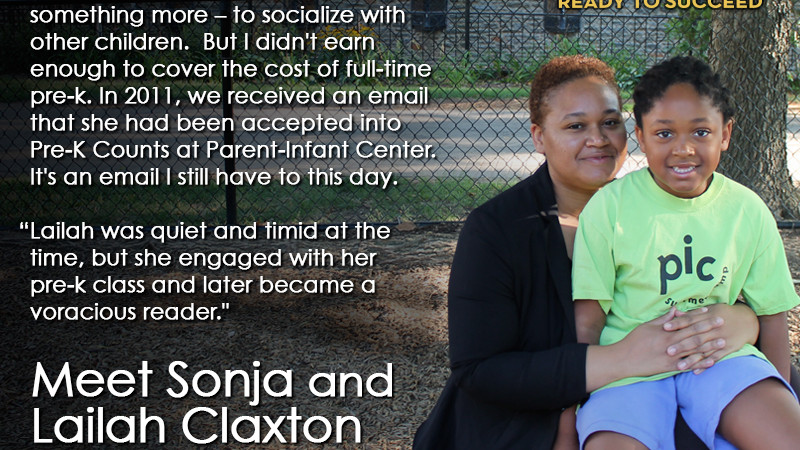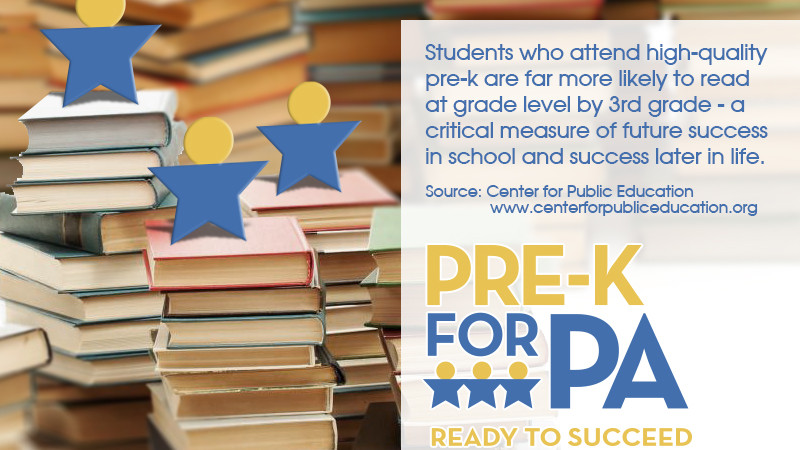
Part of our #100days100stories countdown to Election Day. Share your story at prekforpa.org/join.
SONJA CLAXTON, PHILADELPHIA, PA
“I graduated in 2008, during the Great Recession, and was expecting my first child two months later. Each night, I put my baby, Lailah, to bed and stayed up for hours looking for work. I had no job prospects and decided instead to focus on caring for my newborn. We spent most of our days between the park and the library. She got her first library card at 6 months old, and almost every day we stopped in for new books.
“The economic strains were too much to bear for my husband, so we split and my daughter and I would soon find ourselves homeless and penniless. Despite the circumstances, we were always able to locate our closest library. But there were only so many trips to the library one could take. After spending a year at home with me, I recognized my daughter needed something more – to socialize with other children. I enrolled her in daycare, only to hear teachers screaming at children to go to the potty and watch children propped in front of the TV.
“I stumbled upon the Children’s Hospital of Philadelphia’s (CHOP) Early Head Start program, a home visitation program for low-income parents of children ages 0-3. During our time at the Early Head Start program, Lailah and I participated in socialization activities for families and children – including messy activities with paper and glue, sing-alongs and story time.
“I was soon employed but didn’t make enough to cover the cost of full-time pre-k. My counselors at Early Head Start encouraged me to apply for the federal Head Start program as well as Bright Futures and Pre-K Counts. Through Early Head Start, I learned about Keystone STARS and attended the region’s early childcare conference, hosted by the Delaware Valley Association for the Education of Young Children (DVAEYC). I received an email in the summer of 2011 that Lailah had been accepted into the Pre-K Counts classroom at Parent Infant Center – an email I still have to this day.
“She was quiet and timid at the time, but I would soon find pictures of her in the PIC newsletter engaged in activities. She became a voracious reader. On weekends, she would gather our family together for circle time to share and explain the pages of her favorite books. She learned about countries around the world, how to manage her emotions and even how to count in Mandarin. More than anything else, she and I were relieved. She was free to explore, examine and question the world around her, and I was able to go back to work with ease knowing that she was getting the education and care she needed.
“When she graduated kindergarten, she was comfortable with the course work, passionate about being in the classroom and open to learning more. In just a few weeks, Lailah will enter the first grade – I could not be more proud or excited to see my daughter blossom – thanks in large part to high-quality pre-k and the power of reading.” |
Share on Facebook:
Share on Twitter:
|

Too many families face the painful choice between paying their bills and providing their child an early education.
This week, Pre-K for PA introduces a new report laying out options for our elected leaders to solve this problem.
Kevin is a dad from Chester County who could not manage the cost of sending his son to a good-quality pre-k. Now, his 6-year-old has had trouble socializing and getting used to the kindergarten classroom environment. He firmly believes that his son missed out on valuable learning and growing opportunities that could have better prepared him for school.
In Pittsburgh, Walter struggled but made it work for his daughter. “There are very few high-quality, public preschools available in Pittsburgh,” he described to Pre-K for PA. “We had to put her in a private preschool, which costs us $500 per month. Although we did get financial aid, it has been a struggle to pay this amount every month. Fortunately, it is a NAEYC-accredited school and we all love it. My daughter loves going to school.”
High-quality pre-k is out of reach for too many of Pennsylvania’s families.
New Pre-K for PA Report: Financing Access to High-Quality Pre-k
In a single year, nearly a quarter-million Pennsylvania children are left without the opportunity to benefit from high-quality, publicly funded pre-k. To learn how Pennsylvania can close its early learning gap, read “Financing Access to High-Quality Pre-k,” our third and final issue brief in a recent series.
Kevin’s second child is now 1-year-old. Let’s make sure that as she approaches kindergarten, a stronger system is in place for our families, schools and communities to thrive.
Let’s make high-quality pre-k a priority during these final days leading to Election Day. Ask your friends to sign our petition at www.prekforpa.org/join. To go further, download our new “Take Action from Home” toolkit.
Thanks for everything you do for Pennsylvania’s children.
– The Pre-K for PA team
Share the “Out of Reach” graphic on Facebook or Twitter.


The Mercury Letters: Pre-K education is needed throughout Pennsylvania
As an early childhood educator, I know that we have only one chance to prepare our children for their future education and their future success. I see firsthand every day how children who attend preschool programs dedicated to high quality are introduced to and practice crucial life skills that serve as a foundation for academic learning in school.
Preschool programs dedicated to providing high-quality early education understand that there are many foundational skills that children need in order to be successful in school and life.
Read more at the source.

The Morning Call: Pre-K programs help prepare next generation
I read with interest Lee Butz’s recent Your View (“Increased funding for preschool education a wise investment”) about the impact that pre-kindergarten programs can have on young learners.
As a retired rear admiral of the Coast Guard, I know firsthand just how difficult it is to find qualified men and women to fill the ranks.
A recent Wall Street Journal article reported that the “Defense Department estimates that 71 percent of the roughly 34 million 17- to 24-year-olds in the U.S. would fail to qualify to enlist in the military if they tried.” This level of ineligibility has obvious consequences for our armed services and civilian employers alike.
The documented impact of early education is impressive, and I am encouraged by the actions of local businesses to expand access to these services through the preschool scholarship program.
Read more.

The Kennett Times: DAs back pre-K to fight crime
What does Pre-K have to do with crime prevention?
Considering that approximately 70 percent of our nation’s state prison population failed to receive a high school diploma, education is a pivotal factor between incarceration and productive citizenship. Long-term research is clear that high quality pre-k can boost graduation rates by as much as 44 percent and keep young people on the right side of the law.
Knowing this, district attorneys have long supported investments in high-quality pre-kindergarten as a key crime prevention strategy.
View the full letter.

Newsworks: Roadblocks to child care snag Philadelphia’s student parents
A recent survey found that there are about 15,000 young Philadelphians lacking a high school diploma who are not currently enrolled in school or employed.
In order to better understand the “why” behind this number the advocacy group Public Citizens for Children and Youth studied how access to child care for young parents affects high school completion rates.
Full story & Interview with Pre-K for PA field organizer Della Jenkins at the source.









